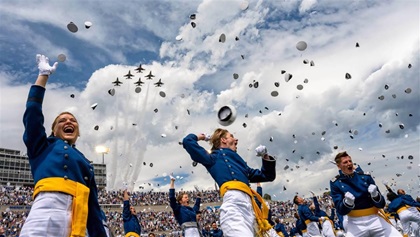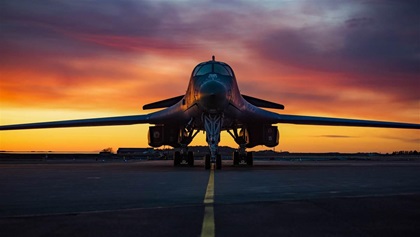Respect
Find out what it means with a military career

The parent asks, “Are you sure you want to do this?” And with this nation’s up and down attitude toward its military over the years as well as the inherent dangers of a military career, one can’t blame the parent. But the TV teen gets it right: “I won’t be alone. I’ll be a part of a team. Making an impact.”
AOPA Air Safety Institute Senior Vice President Richard McSpadden spent 20 years in the U.S. Air Force and served as the flight leader for the U.S. Air Force Thunderbirds. He offers these five reasons to consider military training:
- Superb training…and you’re getting paid to do it.
- Every hiring entity respects military flying experience, so even if you don’t make the military a career, you will be qualified for virtually any flying job.
- Camaraderie that is very difficult to replicate. Make lifelong friends even though you may not see them for decades.
- Amazing flying, challenging flying, a true sense of mission and purpose.
- You will be a better person and a better pilot for the experience.
Seth Lloyd
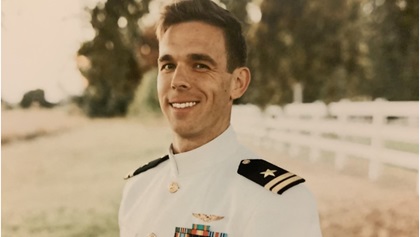 Seth Lloyd graduated from the U.S. Naval Academy in 2011 and served as a weapons systems officer on the F/A-18. He left the Navy in 2020 to join a defense contractor in the Washington, D.C., area. Married with a 2-year-old daughter, he wanted to “see what the rest of the world has to offer.”
Seth Lloyd graduated from the U.S. Naval Academy in 2011 and served as a weapons systems officer on the F/A-18. He left the Navy in 2020 to join a defense contractor in the Washington, D.C., area. Married with a 2-year-old daughter, he wanted to “see what the rest of the world has to offer.”
That’s a tall order since in addition to his training and missions around the country, he also spent a year on the USS Theodore Roosevelt sailing and flying around the world. “There is nowhere else that you will get the level of training, become comfortable in your flying, and get paid to do really cool things,” he said. “I’ve heard it said we do in a month what civilians [learning to fly] do in six. The breadth of experience you receive in the military cannot be overstated.”
Nor can the camaraderie: “Aviation is a team sport in the military—we help each other get better, there’s competition to be better. We feed off each other. If your wingman sucks, you suck,” he said. “We all get better together. There’s nothing like military flight training to get really good at flying.”
Meet Kenneth Thomas
Air Force reservist is giving back, sharing the passion
By Jennifer Non
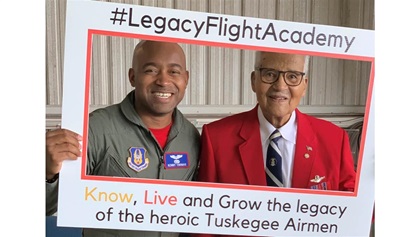
Sometimes all it takes is one airshow, or several, to realize a dream. That’s what did it for Kenneth Thomas, a major in the U.S. Air Force Reserve. Thomas attended airshows with his parents, who were both in the U.S. Air Force, and knew that one day, he, too, wanted to fly. Thomas attended the University of Texas, San Antonio, on an ROTC scholarship, and earned a bachelor’s degree in mathematics. At the same time, he also earned his commission, became a navigator on an E–8C Joint Surveillance Target Attack Radar System aircraft, and finished his civilian flight training.
Thomas is commander of the U.S. Air Force Aim High Flight Academy and separately works as the diversity and inclusion program manager for Dobbins Air Reserve Base in Georgia. The Aim High Flight Academy is the Air Force’s free three-week summer youth aviation program that aims to increase diversity within Air Force aviation careers. Thomas is also president of the Legacy Flight Academy, a 501(c)(3) nonprofit organization that works to expose youth from underserved and underrepresented communities to aviation and science, technology, engineering, and math (STEM) opportunities through character-based youth aviation programs that draw upon the legacy of the Tuskegee Airmen.
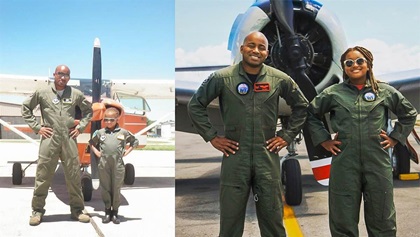 A busy civilian flight instructor, instrument instructor, and multi-engine instructor, Thomas is CEO and flight instructor for Kilo Tango Aviation, which provides aviation consultation and preparation services for aspiring aviators. He also volunteers as a T–28 warbird pilot for the Museum of Flight in Georgia.
A busy civilian flight instructor, instrument instructor, and multi-engine instructor, Thomas is CEO and flight instructor for Kilo Tango Aviation, which provides aviation consultation and preparation services for aspiring aviators. He also volunteers as a T–28 warbird pilot for the Museum of Flight in Georgia.
Thomas shares his love of aviation with his family: “My daughter recently earned her private pilot certificate and I am extremely proud of her. I encourage people to share their passions with their children. They may not emulate your career path, but they will emulate your passion.”
Jayme Warren
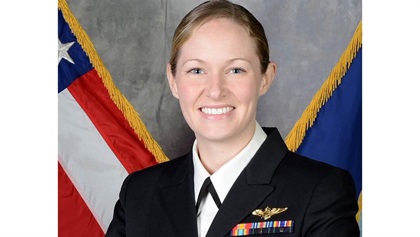 Jayme Warren graduated from the U.S. Naval Academy in 2007. “After I graduated debt-free from the Naval Academy with a bachelor’s degree and completed flight training in Pensacola, Florida, I didn’t have an appreciation of my situation. It wasn’t until talking to my older brother about his civilian undergrad flying program and resulting student loans that I realized the benefit of military training. Not only had I been paid to train full time in some really cool aircraft, but I had full benefits, and a lot of fun too,” she said.
Jayme Warren graduated from the U.S. Naval Academy in 2007. “After I graduated debt-free from the Naval Academy with a bachelor’s degree and completed flight training in Pensacola, Florida, I didn’t have an appreciation of my situation. It wasn’t until talking to my older brother about his civilian undergrad flying program and resulting student loans that I realized the benefit of military training. Not only had I been paid to train full time in some really cool aircraft, but I had full benefits, and a lot of fun too,” she said.
With two children and a husband also in the military, Warren believes the friendships made in training are very important. “The friends that I have made throughout my military career have truly become my family. While it is not always easy moving around as much as we do, especially now with two young children, wherever we are, we have always been able to build up our support system,” she said. “Military families understand the challenges we face and are really good at supporting one another.”
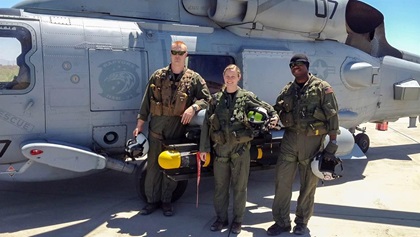 As for the amazing flying opportunities, she said, “Most days, I still can’t believe the military pays me to go fly. Whether it’s landing the helicopter on the back of a small, pitching ship deck on a dark night, or firing missiles, rockets, and guns from the aircraft, it is always a blast to come together as a crew to complete our mission. You will be a better person and a better pilot for the experience. The training and operational scenarios we experience on a day-to-day basis are what set military aviators apart.”
As for the amazing flying opportunities, she said, “Most days, I still can’t believe the military pays me to go fly. Whether it’s landing the helicopter on the back of a small, pitching ship deck on a dark night, or firing missiles, rockets, and guns from the aircraft, it is always a blast to come together as a crew to complete our mission. You will be a better person and a better pilot for the experience. The training and operational scenarios we experience on a day-to-day basis are what set military aviators apart.”

